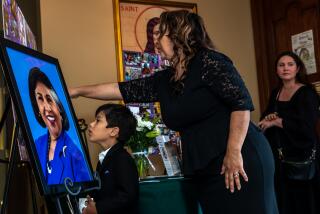Obituaries : Carmen Polo de Franco, 87; Widow of Spain’s Gen. Franco
- Share via
MADRID — Carmen Polo de Franco, the widow of Spanish ruler Gen. Francisco Franco and a major force behind the heavy censorship imposed during his 36-year reign, died Saturday at home. She was 87.
Her doctor, Dr. Vicente Pozuelo Escudero, said she died of complications from bronchial pneumonia. He said she had been suffering from the condition since Feb. 1. Mrs. Franco also suffered from chronic arthritis.
Queen Sofia went to Mrs. Franco’s Madrid apartment to deliver condolences to her daughter, Carmen Franco de Martinez-Bordiu, 60, and her husband, on behalf of King Juan Carlos I and herself.
In 1969, Franco designated Juan Carlos to be his successor, and Juan Carlos resumed the Spanish monarchy two days after Franco’s death on Nov. 20, 1975. Juan Carlos’ grandfather, King Alfonso XIII, had been a sponsor at Franco’s wedding.
Absolute Ruler
Franco, as absolute ruler of Spain, had the power to name whomever he wanted as his successor.
Mrs. Franco was born Carmen Polo on July 9, 1900, in the northern city of Oviedo.
When her husband died, Mrs. Franco became the figurehead of a loosely formed organization of Franco’s political followers, called “El Movimiento,” or the movement. There are no longer any members, but each anniversary of Franco’s death prompts thousands to march in the streets.
Mrs. Franco was the daughter of a wealthy businessman and was educated by Salesian nuns.
She married Franco, then an up-and-coming army lieutenant colonel, on Oct. 22, 1923, and the couple left soon after for Spanish Morocco, where Franco was responsible for much of the conduct of the Riff Wars.
‘La Senora’
Mrs. Franco, known as “La Senora” throughout the Franco period, exercised a strong influence on her husband, particularly in connection with affairs of the Roman Catholic Church and public morality.
Social historians say her puritanical upbringing was responsible for the heavy censorship of anything touching on sex or sexual matters in Spanish literature, theater and cinema during the most repressive years of the 1939-75 Franco regime.
A 1986 Spanish film, “Dragon Rapide”--the first to depict Franco as a historical figure--portrayed Mrs. Franco as an attractive, strong-willed woman whom Franco consulted before deciding to assume control of an army revolt in Spanish Morocco that eventually led to the outbreak of the civil war.
Franco led the rebellion against the Second Republic that started the civil war. After his forces won, he established an authoritarian regime and held power until his death.
Burial was scheduled for today in the village of El Pardo on the outskirts of Madrid, said a family friend who answered the telephone at the apartment of Mrs. Franco’s daughter.
In addition to her daughter, Mrs. Franco is survived by seven grandchildren and numerous great-grandchildren.
More to Read
Sign up for Essential California
The most important California stories and recommendations in your inbox every morning.
You may occasionally receive promotional content from the Los Angeles Times.













